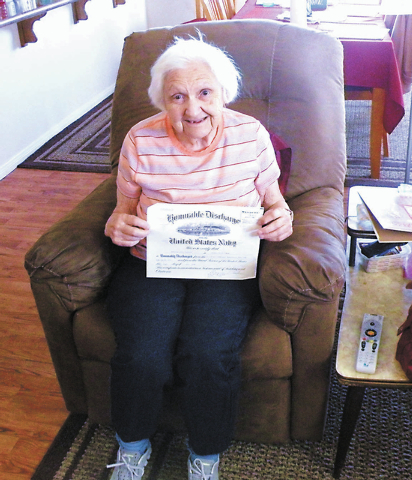Military honoree has vivid memories of World War II
Pauline Pavlick heard about the bombing of Pearl Harbor in 1943, and at 20 years old, she enlisted in the U.S. Navy. Today, she is 93, lives in Pahrump, and is about to be honored at the first-ever recognition of women veterans in the whole of the United States. Local research indicates there has never before been an honoring of women veterans in all branches of the service at one ceremony, according to Town Board member, Dr. Tom Waters.
Pavlick said she remembers sitting at home with her family in Detroit, Mich., listening to a symphony on the radio. She said, “There we were in the quiet peace of our home, and came the announcement that Pearl Harbor had been bombed and many U.S. ships sunk and it was announced that war had been declared by President Roosevelt. The announcer said, ‘They’re sinking our ships.’ They killed over 30,000 of our guys.
“Everyone had been restless, wondering what was going to happen in Europe and what we would do as a nation. I signed up, and became a Navy WAVES (Women’s Auxilliary Volunteer Emergency Services).
“We (the women) were taken to boot camp in New York, by train with 100 other ladies and we got off at Grand Central Station with no idea what to do. I was the only one in my family to enlist.”
In the first six months of the war 27,000 women enlisted in the Waves.
“They gave us ‘clodhopper shoes,’” said Pavlik with a little laugh. “Besides that, we had a flat hat with a brim, but otherwise we wore our own clothes until they could measure us for uniforms. They put us in a barracks, four in a room with bunk beds.” No small, medium and large in those days. A seamstress took measurements for each woman and made them three uniforms each: one to wear, one at the cleaners and one on the shelf.
“We marched everywhere — to breakfast, lunch and dinner, to and from exercise, to the bathroom (that last was a joke). The good thing was that the non-commissioned officers brought us breakfast,” she said. “It was a hard time though. We worked hard and didn’t ask a lot of questions.” They had the USO for Christmas and a different movie every night, but we were otherwise either sleeping or on the job.”
When the Waves were moved to Washington D.C. to the Naval Yard, Pavlick said, “Our barracks were just huts … bare, thin walls, and were hot and wet in the summer. We had lighter uniforms for summer but they were still hot. There was no air conditioning and fans were hard to get. It could get miserable, but we were there to work, and we did.”
Pavlick continued, “In those days, Waves were making fuel for rockets. I was part of the typing pool and filled out all the forms about soldier’s movements and changes.”
A soldier’s activities from signing on, to leaving the service were all recorded. Naval records went through Pavlick’s office. It was critical to have every letter and number right, or a soldier’s orders would be incorrect, their records would be wrong, and it could make a difference between order and chaos and difficult for a soldier in his/her movements through the war. “We had to get it right,” she said.
“Then, like now, my thoughts about the military were and are that accuracy was essential. Being clear with no side issues was how you had to be, and everything we did, men and women, was about pulling together.” Why did she pick the Navy? Pavlick said, “Things were just better in the Navy — the food, the uniforms, the pay – everything.”
When she got out of the service, she went to Wayne State College in Michigan on the GI Bill. “As the years go by, it matters more” (that she was part of the World War II services), said Pavlick. “Being there, and being part of the support was, and still is, an anchor for the rest of my life. It gave me perspective.”
Pavlick lives with her niece in Pahrump and occupies her time drawing and painting. Cats and kittens are her specialty.
















